- Home
- Kim Newman
Bad Dreams
Bad Dreams Read online
Kim Newman
Bad Dreams
***
"First you dream, then you die…"
In Bad Dreams the modernist horrors of Clive Barker and Freddy Krueger fuse with fairytale fears that last into adulthood to form a nightmare from which there is no waking up.
Anne Nielson, an American journalist, comes to London to investigate the strange death of her sister, Judi. She soon becomes trapped in a netherworld of sado-masochist clubs, suburban swingers, and drug-dealing would-be master criminals. Here she meets the Monster, an immoral life-taker who lives at the center of his own twisted dream and feeds on the living memories and fantasies of other people. Sucked into the world of the newly damned, Anne is hurtled toward a final confrontation where she has only the dead as allies.
***
From Publishers Weekly
This sporadically gruesome and nearly always frightening horror tale is not for the squeamish or faint of heart, but readers enthralled by things that go bump in the night are in for a treat. When journalist Anne Nielson goes to London to investigate the death of her sister Judi, a drug-addicted prostitute, she finds herself enmeshed with the denizens of Judi's nightmarish world: dealers, pimps, sadomasochists and, most horribly, the Monster, a member of the Kind-a ghoulish race kept eternally alive by eating humans and ingesting their dreams. Newman (The Night Mayor) pits his spirited heroine against this fiend in several brutal, shocking and tense encounters. One might expect that the immortal Monster would have the upper hand, but Anne, certain that he killed her sister, proves a formidable foe. Will her dreams be won by the Kind? Fans of the genre should enjoy finding out.
***
From Kirkus Reviews
Riotously inventive horror fantasy, the second novel by the author of the wildly original The Night Mayor (1990). Newman trumps up some superbly clever devices here, and at last creates a heroine we can care about, or almost care about, before she fades into the Dreamscape. The American sisters Anne and Judi Nielson and their half-brother Cameron Nielson III (a famous minimalist composer), children of Nobel Prize playwright Cameron Nielson, live in London, where Anne writes and Judi, a junkie S&M prostitute, hires herself out to be beaten. In the first chapter, Judi is eaten alive while turning a trick, or has the blood and most of her flesh sucked out of her, as well as her mind and memory, by Mr. Skinner, a vampire known as the King of the Cats, or leader of the Kind, who was once a master of the now-vanished Immortal Empire. Very few vampires still walk about, and Mr. Skinner himself has only one rival, Ariadne, a sexy vamp much older, smarter, and more powerful than he. Anne tries to trace Judi's path through the whoreworld to find out just how her sister's corpse had aged into a very old woman's. Judi's prostitute friend Nina leads Anne to the mansion of Amelia Dorf ("It was the kind of quietly well-off residential street where mass murderers live…''-a kind of Karloffian understatement) where an S&M party is in full swing, ruled by the Game Master, Mr. Skinner. We'll say no more, only that Mr. Skinner's vampirism is a boldly invented passionate state that can barely be contained by human form; that the Old Dark House becomes a dream house in which rooms lead into mindrooms into dreamrooms; that at one point Mr. Skinner falls into a feeding frenzy and eats up the whole party, then licks his lizard-long tongue at Anne and begins chasing her through the walls… When you meet Mr. Skinner, remember that he bears the memories of all his victims, and that when you join him you join all of them as well. Comforting.
***
From Library Journal
When her sister is found dead in London's Soho district, journalist Anne Nielson begins a private investigation that leads her to a sordid underworld of prostitution, drugs, and kinky sex before plunging her into a terrifying nightmare world inhabited by an immortal killer who feeds off the lives and dreams of his victims. Graphic descriptions of sex and violence place this novel by the author of The Night Mayor (Carroll & Graf, 1990) firmly inside the boundaries of splatter fiction. Newman's heady surrealism and knife-edge prose, however, give the story a sophistication that is unusual to the genre. Recommended, with qualifications, for libraries with strong horror collections.
***
DEDICATION
For The Peace and Love Corporation, Plc.
EPIGRAPH
'First you dream, then you die.'
-Cornell Woolrich
THE MORNING BEFORE
ONE
JUDI DREAMED she was waking up. Without moving, she got out of the double bed, pulled a rough towel robe over the things she was still wearing, and searched the mess on the carpeted floor for her Camels. She found most of her clothes, relatively unspoiled, mixed up with Coral's. Also three empty Dom Perignon bottles, a shredded Iris Murdoch paperback, some studded leather fripperies and a multi-coloured scattering of pills. Her head was an open wound, leaking steadily, and she had either vomited recently or would do so soon. She hauled her heavy black jacket out of the heap and patted its zippered pockets. No luck. She walked across the room, knees and ankles threatening to fail her, and became acutely aware of the sticky ache between her legs. Sweet Jesus, did we get raped again?
Most of one wall was mirrored. On this side only, of course. The room beyond was dark. Even if she put her face close to the glass she couldn't see through. It was probably empty this early in the morning. The show was over. She sat at the dressing table and scratched her scalp. The spiky perm was well into its decay. She pulled her handbag open and went through it. The Camels were there, but someone had snapped her disposable lighter in half. Her money, credit cards, diary, hankies and address book were soaked. She stuck the least wet cigarette in her mouth, hoping she would not burn half her face off.
No matches. She would have to wake Coral. The other girl was still in bed, comatose. She had been twisting and turning as if buried alive. A nylon sheet wound around her like a soiled blue boa constrictor. The bare mattress was missing several buttons, and patterned with old pee, blood and come stains. In the bruising on Coral's back, bottom and legs, Judi could see designs. The yellow and blue smudges were handsome faces with red welts for eyes. The faces coalesced, making a Japanese dragon with heaving shoulderblades for wings and penny-sized scales of ragged flesh.
The little green scorpion tattooed on Coral's wrist scuttled out from under her digital watch and took refuge in her armpit. Judi was back in the bed now, sinking into the mattress, soothing the ruffled dragon with practised massage. She had given up on Coral's matches, and spat the Camel out onto the pillow. The bed hugged her. The duvet slithered up over her bare legs. Judi's eyes turned inward, focusing on a white hot point three inches behind the bridge of her nose. The pain went away.
She was not dreaming she was awake any more. She opened her eyes and saw the skylight. The dingy grey looked about ready to fall. She had always thought Chicken Licken had a better grasp of cosmology than Galileo.
Really awake, she sat up in bed, wearily ready to go through it all again.
That was when she realised she was handcuffed to a severed arm.
TWO
THE OLD, OLD MAN watched, his own reflection faintly superimposed on the dusty one-way glass. In his current condition, he was glad not to be looking at the silvered side of the mirror. He had lost a lot of weight recently. He did not like to be reminded of his flesh. It was turning into greasy lumps that shifted and shrank beneath his slackening skin. The fabric of his quilted dressing gown hung heavily on his arm as he raised a hand to the cold glass. His fingers were dead, the knuckles swollen with ersatz arthritis.
He was unaroused by the spectacle. Judi was thrashing around the room, unsuccessfully trying to rid herself of the dead weight hanging from her wrist. She was screaming, but he had chosen to switch off the intercom. He could still just hear the racket, but these Victorian
walls had been built for privacy. Already, the girl was beginning to wear herself down. Already, he was beginning to feel the warmth.
He knew his face was filling out, settling comfortably again onto his skull. His hands grew fatter. The skin crept back over the half-moons of his fingernails. His fingers bent, knuckles cracking, he made a comfortable vice-grip fist. He felt himself expanding to fit his clothes. His dry mouth filled again with water. His teeth swelled, and sharpened, changing the shape of his jaw, making him grin.
Now, he was ready for Judi.
He used the connecting door. It had never been locked, but there was no handle on her side. Judi had finished with her hysterics, and was back in the bed. She was coiled in a foetal ball, with Coral's arm sticking out in place of an umbilical cord. The little green scorpion was resting. It had been neatly done. There was almost no blood. The room smelled musty. He caught the residues of spent lusts in his nostrils, and drew them into himself, tasting them as they went down.
The things he had watched last night were replayed inside his head. He smiled, new skin tight over his cheekbones. Judi, he remembered. And Coral. The clients. Pain and pleasure, locked together. And the almost pathetic pettiness of it all. It had barely been an appetiser for what he would do now. Coral, a pretty but dull girl, would have been a less substantial delight than Judi. Barely a morsel. But still, it was a shame she had been wasted. Her death had given him little sustenance.
He climbed into bed and cuddled Judi. He touched her fractured mind, feeling for the spots that would give first, sinking black fingers into her confusion. She was delicious. He stroked her side, his nails turned to bony scalpels. He opened her at the hip, and scraped the bone. She convulsed like an electro-shock patient. He clamped a passionless kiss over her shriek. He swallowed air, and her cries echoed inside him.
He fed off her for hours, until her heart burst.
DAYTIME
ONE
ANNE WAS waiting for The Call.
Every couple of days, she would telephone the old family home, and talk with Dad's nurse. She had never met the woman, and at the echoing end of the transatlantic line, she sounded like a little girl a long way away. Her father had had his second stroke back in September, and all the doctors were expecting the third soon. If not before the end of the year, then early in January. The first heart attack, three years earlier, had just slowed him down and slurred his words. The second had put him in a chair and made talking a supreme effort. The third would kill him.
She had the Radio 4 early morning current affairs show on in the tiny kitchen, and the Channel 4 breakfast television service on in her front room, and was dividing her attention between them, following several stories as they broke. It was mostly international activity, in Central America and Eastern Europe, but there were a few local, London-based, items she was keeping an ear to. She had already done her two days in the newsroom this week, but she was scheduled to turn in a couple of pieces by Friday, to meet the deadline for the Christmas double issue. The Aziz inquest would be turning in a verdict in the next few days, and, depending on the degree of officially admitted police involvement in the youth's death, that would affect the conclusions she would draw in the last of her articles on racist attacks.
The old boiler rattled, and Anne checked the heating. The flame was going full inside, but the flat was not getting any warmer. She really ought to start looking for a new place in the New Year. When her father died, there would be some money from the estate. She shivered with the thought, and tried to unthink it, forcing it back into the blacks of her mind. She shivered again, only with the cold, and pulled her robe tighter over her nightie. It would be warmer when she had her clothes on.
There were tanks moving through rubble-strewn streets on television, and a foreign correspondent on the radio was making a report with the whoosh of anti-tank rockets in the background. Anne was not sure whether the coverages were of the same crisis. Usually, news wound down for Christmas; this year, events were speeding up as the holiday approached. Some governments were probably planning to spring nasty surprises over the Christmas break, purely to avoid publicity. TV programmers had already overloaded the airwaves with blockbuster movies, light entertainment specials and quiz-of-the-year features, and there was no room at the inn for states of emergency, covert activities or the odd execution.
She had a morning at home due, and the notes for her pieces were neatly piled by the word processor in the front room. That meant, since she did not have to struggle through the rush hour to get to Clerkenwell, she could take some care over breakfast. The most important meal of the day,' her British friends would tell her as her stomach somersaulted at the sight of grease-grilled bacon, runny eggs and a horror they called fried bread. In the kitchen, a cheerful vicar on Thought for the Day' was trying to draw some Biblical parallel between current events and those in Nazareth at the time of the Nativity. While her old-fashioned percolator dripped thick coffee, she mixed St Michael's Thick and Creamy' strawberry and mango yoghurt with Neal's Yard muesli, and added just a little milk. Two croissants were gently warming in the depths of the oven.
At eight o'clock, the radio and the TV hit news bulletins at the same time, and told the same stories in slightly varying ways. Anne did the remains of last night's washing-up. Two teacups, two wine-glasses, and the dug-out-from-somewhere ashtray. For a moment, she wondered if Mark had expected to stay the night with her. She thought that was not going to happen, but recently, he had been a bit broody around her at the office. He went all quiet and British when she was talking to anyone else, and was hearty with her in that slightly hollow way of his. She put the dripping cups and glasses up on the rack to dry. She was getting the impression that Mark was capable of a species of desperate devotion she would find stifling. For her, this year, turning thirty without having been married or had children had not been the stereotypical shock. The only thing she wished she had done was write a book, and there was plenty of time for that. Maybe she could fix up the racist attack series. It was an important subject.
She took the croissants out, welcoming the outrush of warm air from the oven. Outside the fire escape window, she could see frost-furred ironwork. It was cold, and the forecasters were saying it would get colder. She carried her breakfast tray through to the front room. The television was warning of a traffic snarl-up in North London. The trains were running intermittently because of the cold. Every year, winter caught London Regional Transport by surprise, as if they expected a dingy summer to stretch on until the year's end. Anne's fingers felt the chill, and she warmed them on the croissants. Sitting at the folding table she had pulled out for Mark and not put away, she ate the croissants and watched the television.
Usually, with her breakfast, she opened her mail and set aside letters that needed immediate replies, listed cheques in her account books and paid bills. She liked to get that out of the way before she started anything. Her father's lawyers were sending her a packet of legal documents federal express. But, thanks to the Christmas post, the mail was not arriving until late in the morning this week. She already had too many cards for her limited mantelpiece and shelf space, and was beginning to regret her decision not to bother this year. She took her first caffeine hit of the day, and considered the museli and yoghurt.
At first, the expectation of The Call had been constant. Every time she heard a telephone ring, even if she was not in her flat or an office where she could be traced, she had been instantly certain that this was it, and felt her heart squeeze. Then, the dread had turned to a dull resignation, although she realised that, when it came, it would still surprise her.
Fathers died, she knew. Hers had written an entire play about the fact. And when the third seizure came, the film of the play would undoubtedly be pulled out of the vaults and shown on late-night television as a tribute. She had videoed On the Graveyard Shift at Sam's Bar-B-Q and Grill the last time it was on, but had not got around to watching it again. Produced on Broadway in 1954 and filmed i
n 1955, the property had been cited by the Nobel Prize Committee as a great achievement, but it had also dwarfed everything else Cameron Nielson ever did, including raise children. Anne still found it hard to associate the play, written before she was born, with the distant, kindly, disappointed man she had known all her life. In the big, last-act speech, where Maish Johnson - the role that proved Brando's Stanley Kowalski was not a one-off achievement - angrily expressed his grief at the death of Sam, the fatherly-wise owner of the all-night Bar-B-Q and Grill, and denounced everyone else's numbed reaction to the bad news, Anne knew that her father had written the cornerstone of his own obituary. He had been a young man when he wrote Maish's speech, fiercely identifying with his hero; how would he feel now that he had been pushed, presumably kicking and screaming inside his chairbound bone-and-flesh prison, into the Lee J. Cobb role of Sam?
She took a spoon to the muesli and yoghurt, and mixed them up more thoroughly. The news was starting to repeat, so she zapped from channel to channel, getting an early morning educational show about claw-feed grinding, a hightech commercial for a bank, and three presenters on a pastel couch swapping mild innuendoes with a teenage pop star. The coffee was getting into her system, waking her up. She laced her cold fingers, and rubbed her palms together, generating some warmth. Back at the news, there was a thirty second blip on the Aziz incident: a black and white photograph, grainily enlarged, of the smiling Pakistani at his wedding; another, post-mortem, of his swollen face on a pillow; a brief, live, snippet of Constable Erskine, in uniform, being hustled out of the inquest, dodging microphones.

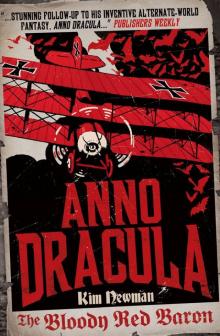 The Bloody Red Baron
The Bloody Red Baron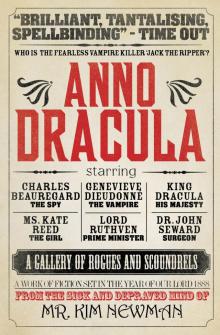 Anno Dracula
Anno Dracula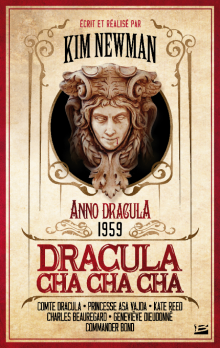 Dracula Cha Cha Cha
Dracula Cha Cha Cha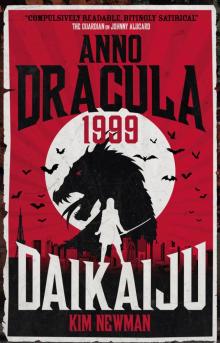 Anno Dracula 1999
Anno Dracula 1999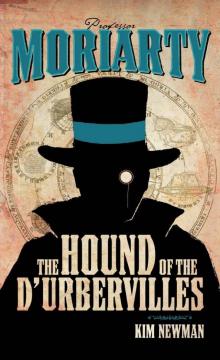 Moriarty: The Hound of the D'Urbervilles
Moriarty: The Hound of the D'Urbervilles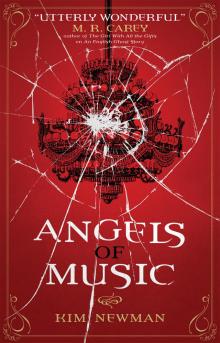 Angels of Music
Angels of Music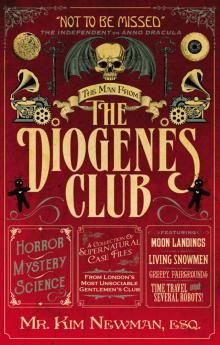 The Man From the Diogenes Club
The Man From the Diogenes Club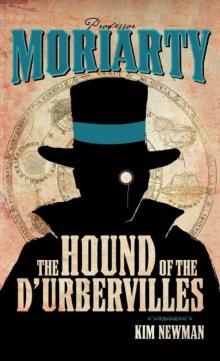 Professor Moriarty: The Hound Of The D’urbervilles
Professor Moriarty: The Hound Of The D’urbervilles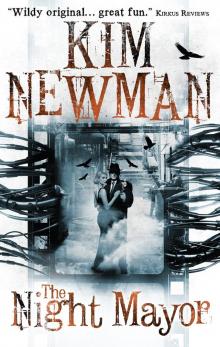 The Night Mayor
The Night Mayor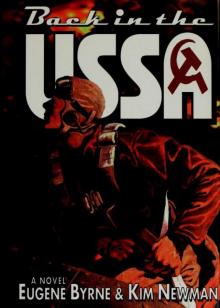 Back in the USSA
Back in the USSA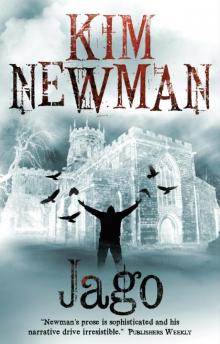 Jago
Jago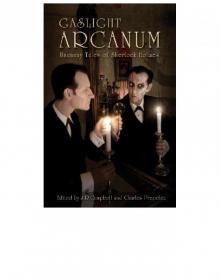 Gaslight Arcanum: Uncanny Tales of Sherlock Holmes
Gaslight Arcanum: Uncanny Tales of Sherlock Holmes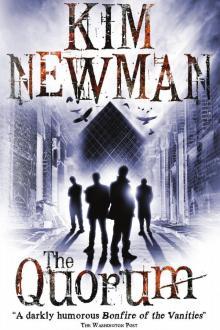 The Quorum
The Quorum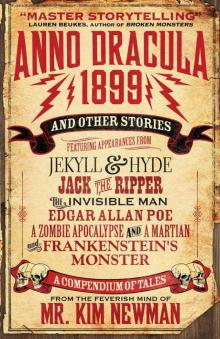 Anno Dracula 1899 and Other Stories
Anno Dracula 1899 and Other Stories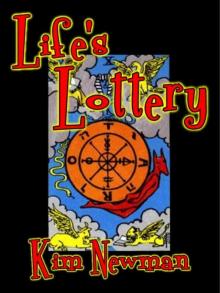 Life's Lottery
Life's Lottery The Secrets of Drearcliff Grange School
The Secrets of Drearcliff Grange School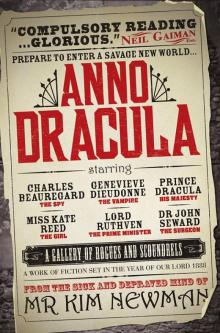 Anno Dracula ad-1
Anno Dracula ad-1 The Bloody Red Baron: 1918 ad-2
The Bloody Red Baron: 1918 ad-2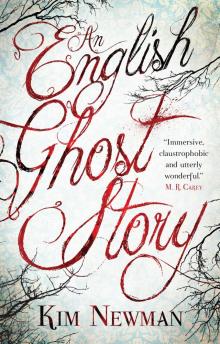 An English Ghost Story
An English Ghost Story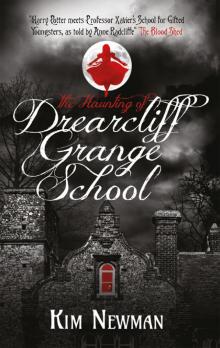 The Haunting of Drearcliff Grange School
The Haunting of Drearcliff Grange School The Other Side of Midnight
The Other Side of Midnight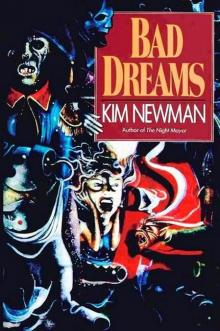 Bad Dreams
Bad Dreams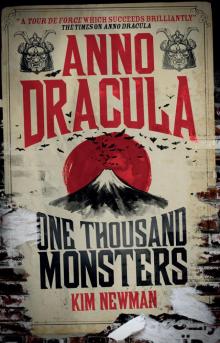 Anno Dracula--One Thousand Monsters
Anno Dracula--One Thousand Monsters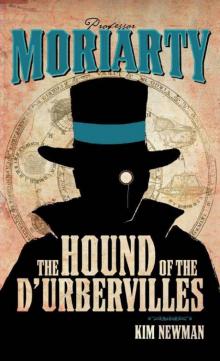 The Hound Of The D’urbervilles
The Hound Of The D’urbervilles The Bloody Red Baron: Anno Dracula 1918
The Bloody Red Baron: Anno Dracula 1918